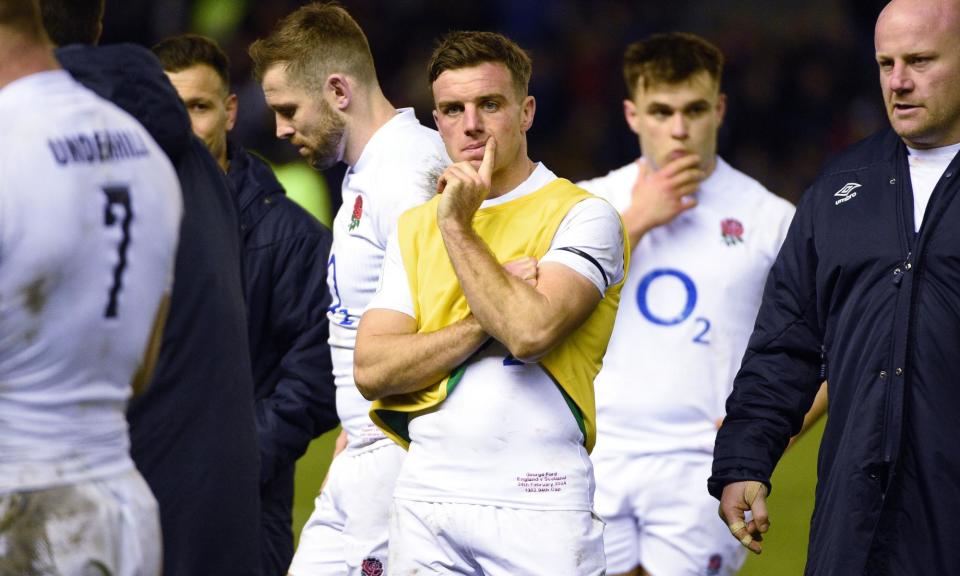Borthwick must decide whether to stick or twist with this England side

Back when Martin Johnson was England’s head coach he often used the same phrase when potentially awkward situations arose. “It is what it is,” he would say before cautioning his audience against getting overly carried away in either defeat or victory. It seldom made for attention-grabbing copy but you could understand it from his perspective. Sometimes there is no instant answer to life’s most pressing questions.
It certainly felt that way at Murrayfield at the weekend. Scotland, as most suspected, looked a better and more cohesive side than England. The visitors, again as widely expected, found the Scots to be tougher opponents than either Italy or Wales. Barring a remarkable upturn, consequently, England look set for a below‑par Six Nations return for the fourth year running.
Related: Finn Russell weaves more magic for Scotland to raise roof at Murrayfield | Gerard Meagher
Anyone surprised by that scenario has been paying insufficient attention. The last time England enjoyed a big Six Nations win away from home against fancied opposition was in Dublin in 2019. They have changed umpteen coaches, support staff, players, captains and gameplans in the interim, only to see others pull way ahead and relegate them to mid‑table mediocrity.
Let’s face it, four successive Calcutta Cup defeats can hardly be dismissed as a blip or a lucky flash in the Murrayfield pan. And how and why does a country with just two professional sides, a worryingly shallow domestic talent pool and squeezed financial resources now embarrass their supposedly better stocked neighbours on an annual basis? Particularly when England were so yawningly dominant in this fixture a decade ago that Scotland could not muster a solitary point against them at home.
If any one stark graph sums up the complacency, muddled thinking and questionable stewardship of the English game over the past decade and a half, that is surely it. Scotland may have the benefit of the remarkable Duhan van der Merwe and the irresistible Finn Russell, but still. While England still mostly see off inferior opponents, they almost always fall short against the better teams. Their favourable World Cup draw masked that reality last year but the Six Nations permits no such shortcuts.
Which leaves Steve Borthwick and his lieutenants with some serious thinking to do. Next up are Ireland, the best side in Europe. France in Lyon will not be remotely straightforward, either. Beyond that are summer Tests against Eddie Jones’s Japan, and the All Blacks (twice) in Dunedin and Auckland. Even the Brave Blossoms might be quietly licking their lips.
So does Borthwick stick or twist? Does he remain loyal to certain ageing players who have been great servants to English rugby but are now increasingly treading water? Or does he conclude it would be more cathartic and beneficial to promote Manny Feyi-Waboso, Fin or Marcus Smith, George Martin, Chandler Cunningham‑South and Alfie Barbeary without any further delay, on the grounds that England no longer have much to lose?
As Wales can testify, picking a callow side against Ireland is nil guarantee of immediate nirvana. Equally, there is no point ignoring the obvious. England’s pack are not terrifying anyone and an enthusiastic defence will lift them only so far up the greasy pole. For all Borthwick’s references to a “new” side, nine of the 23-man matchday squad on Saturday are 29 or over and there is no instant quick fix on the Twickenham horizon.
Related: ‘A painful lesson’: Borthwick admits England not good enough in Scotland
How can it be, for example, that Ollie Lawrence looks a million dollars playing alongside Russell for Bath in the Premiership only to resemble a fish up a tree wearing England’s No 12 jersey? England’s first try was a lovely example of what they can do with slick first‑phase ball but in the second quarter their composure, execution and game management disappeared. It is less about how they set up to play and more that the basics of their attacking game – getting over the gainline fast and early, sure handling, not forcing the pass – are now inferior to the majority of their competitors.
It is a conundrum that Borthwick seems barely any closer to solving than when he succeeded Eddie Jones at the beginning of last year. Reverting to the neolithic World Cup gameplan would be a massive backward step but, equally, so would conceding a half‑century of points at home to Ireland in the name of experimentation. Expect, for now, something in between, with Ben Spencer starting at scrum-half and Feyi-Waboso, a shooting star in the making, on one of the wings.
That said, Martin and Cunningham‑South must be pushing hard while Fin Smith’s match-winning performance for Northampton in Munster last month is fresh enough in Irish minds to consider his elevation from the bench. Now that Rugby Football Union officials have abandoned the idea of potentially swapping their traditional home at Twickenham for Wembley, they need to give their jaded supporters some renewed incentive to show up.
Maybe they should consider taking a leaf out of Scottish Rugby’s book. The game on Saturday was splendidly staged and notable for its stripped-back acoustics and artfully curated music – chapeau to whoever chose Wagon Wheel by the appropriately named Darius Rucker – even before Van der Merwe (aka Van the Man) sent England home to think again.
Scotland’s head coach, Gregor Townsend, though, had it right when he suggested his side’s performance had been well short of flawless. Accordingly we will have to wait until their last‑round game against the Irish in Dublin before gauging whether this is a properly good Scottish team or just one transformed – Fee Fi Fo Fum! – when it smells the blood of an Englishman. And England? They just have to be patient and accept that, right now, they are where they are.

 Yahoo Sport
Yahoo Sport 



































































